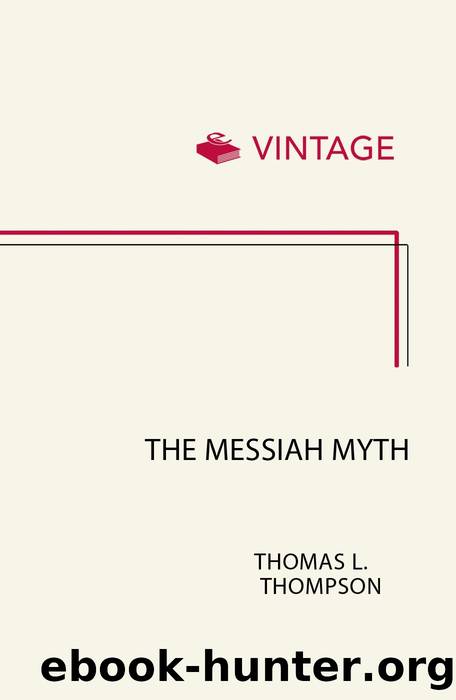The Messiah Myth: The Near Eastern Roots of Jesus and David by Thomas L Thompson

Author:Thomas L Thompson [Thompson, Thomas L]
Language: eng
Format: mobi
Publisher: Random House
Published: 2013-03-30T16:00:00+00:00
On this mountain, the Lord of hosts will make a feast for all peoples: a great feast with rich meats and old wines. . . . The veil that is cast over the nations will be destroyed; he will swallow death forever and the God Yahweh will wipe tears away from everyoneâs face. He will take away the reproach of his people from the whole earth. (Is 25:6â8)
By having Jesus point ahead to meeting the disciples once again in his fatherâs kingdom, there to drink the new wine, the gospel writers identify Jesus impending suffering (âhis covenant of bloodâ) with both Israelâs new covenant and their suffering in exile. Similarly, the future evokedâdrinking a new wine with God in his kingdomâis Isaiahâs ecstatic future, overcoming death. That the readerâs attention is focused on this future of eating and drinking with God is important. How the Passion story is to be read is at stake. The suffering figure of Jesus plays the Pentateuchâs lost generation. The disciples are with Moses and the elders on Mount Sinai. In their heavenly feast, death is overcome through the rapture the story evokes. As in Jeremiah and Isaiah, so in the gospels, the goal is understanding: a glimpse of the transcendent that resolves human suffering (Jer 31:34; Is 25:9; Mt 26:29). The indirection of reiterative narrative and song allows us to read a story about Jesus and his disciples sharing a cup of wine the night before his death through multiple evocations of figures of suffering. Isaiahâs Jerusalem, the elders of the wilderness and the innocent, righteous one of Israel all contribute to the storyâs overtones. Like the figure of the prophetic shepherd from Zechariah, âstruck down, scattering the flockâ to whom Matthew turns as he has Jesus go up to the Mount of Olives (Mt 26:31; Zech 13:7), all of these figures stand within a universal pedagogy of wisdom through suffering.
Download
This site does not store any files on its server. We only index and link to content provided by other sites. Please contact the content providers to delete copyright contents if any and email us, we'll remove relevant links or contents immediately.
The Lost Art of Listening by Michael P. Nichols(7506)
Why I Am Not A Calvinist by Dr. Peter S. Ruckman(4153)
The Rosicrucians by Christopher McIntosh(3520)
Wicca: a guide for the solitary practitioner by Scott Cunningham(3178)
Signature in the Cell: DNA and the Evidence for Intelligent Design by Stephen C. Meyer(3138)
Real Sex by Lauren F. Winner(3023)
The Holy Spirit by Billy Graham(2952)
To Light a Sacred Flame by Silver RavenWolf(2823)
The End of Faith by Sam Harris(2742)
The Gnostic Gospels by Pagels Elaine(2531)
Waking Up by Sam Harris(2460)
Nine Parts of Desire by Geraldine Brooks(2369)
Jesus by Paul Johnson(2362)
Devil, The by Almond Philip C(2331)
The God delusion by Richard Dawkins(2309)
Heavens on Earth by Michael Shermer(2284)
Kundalini by Gopi Krishna(2185)
Chosen by God by R. C. Sproul(2164)
The Nature of Consciousness by Rupert Spira(2108)
